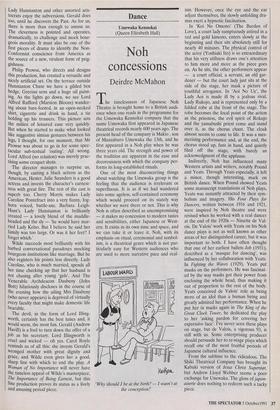Dance
Noh concessions
Deirdre McMahon
The timelessness of Japanese Noh Theatre is brought home to a British audi- ence when one reads in the programme for the Umewaka Kennokai company that the name Umewaka first appeared in Japanese theatrical records nearly 600 years ago. The present head of the company is Makio , son of Manzaburo Umewaka the 13th, and he first appeared in a Noh play when he was three years old. The strength and power of the tradition are apparent in the ease and decorousness with which the company per- forms its long-established rituals.
One of the most disconcerting things about watching the Umewaka group is the feeling that the audience is irrelevant or superfluous. It is as if we had wandered into some ageless, self-contained ceremony which would proceed on its stately way whether we were there or not. This is why Noh is often described as uncompromising — it makes no concession to modern tastes and sensibilities, either Japanese or West- ern. It exists in its own time and space, and we can take it or leave it. Noh, with its emphasis on ritual, ceremonial and symbol- ism, is a theatrical genre which is not par- ticularly easy for Western audiences who are used to more narrative pace and real- 'Why should I be at the birth? — I wasn't at the conception!' ism. However, once the eye and the ear adjust themselves, the slowly unfolding dra- mas exert a hypnotic fascination.
In cKoi No °mono' (The Burden of Love), a court lady sumptuously attired in a red and gold kimono, enters slowly at the beginning and then sits absolutely still for nearly 40 minutes. The physical control of the actor (Yoshiaki Ito) is so extraordinary that his very stillness draws one's attention to him more and more as the piece goes on. As he sits, the other performers appear — a court official, a servant, an old gar- dener — but the court lady just sits at the side of the stage, her mask a picture of youthful arrogance. In `Aoi No Ue', the Lady Aoi is made ill by a jealous rival, Lady Rukojo, and is represented only by a folded robe at the front of the stage. The robe becomes the focal point of the action as the priestess, the evil spirit of Rokujo and the yamabushi priest come and stand over it, as the chorus chant. The cloak almost seems to come to life. It was a mes- merising performance and, at the end, the chorus stood up, fans in hand, and quietly filed off the stage, with barely an acknowedgment of the applause.
Indirectly, Noh has influenced many Western artists and writers, notably Pound and Yeats. Through Yeats especially, it left a minor, though interesting, mark on British dance. When Pound showed Yeats some manuscript translations of Noh plays, Yeats was instantly attracted by their sym- bolism and imagery. His Four Plays for Dancers, written between 1916 and 1921, were inspired by Noh theatre and were revised when he worked with a real dancer at the end of the 1920s — Ninette de Val- ois. De Valois' work with Yeats on his Noh dance plays is not as well known as other areas of her distinguished career, but it was important to both. I have often thought that one of her earliest ballets Job (1931), described as a 'masque for dancing', was influenced by her collaboration with Yeats. In Fighting the Waves (1929), Yeats put masks on the performers. He was fascinat- ed by the way masks got their power from enclosing the whole head, thus making it out of proportion to the rest of the body. Yeats conceived de Valois' role as being more of an idol than a human being and greatly admired her performance. When he put her in masks again in The King of the Great Clock Tower, he dedicated the play to her 'asking pardon for covering her expressive face'. I've never seen these plays on stage, but de Valois, a vigorous 93, is still with us. Some enterprising producer should persuade her to re-stage plays which recall one of the most fruitful periods of Japanese cultural influence.
From the sublime to the ridiculous. The Shiki Theatrical Company has brought its Kabuki version of Jesus Christ Superstar, but Andrew Lloyd Webber seems a poor exchange for Unewaka. The gloss of japan- aiserie does nothing to redeem such a tacky piece.


















































 Previous page
Previous page